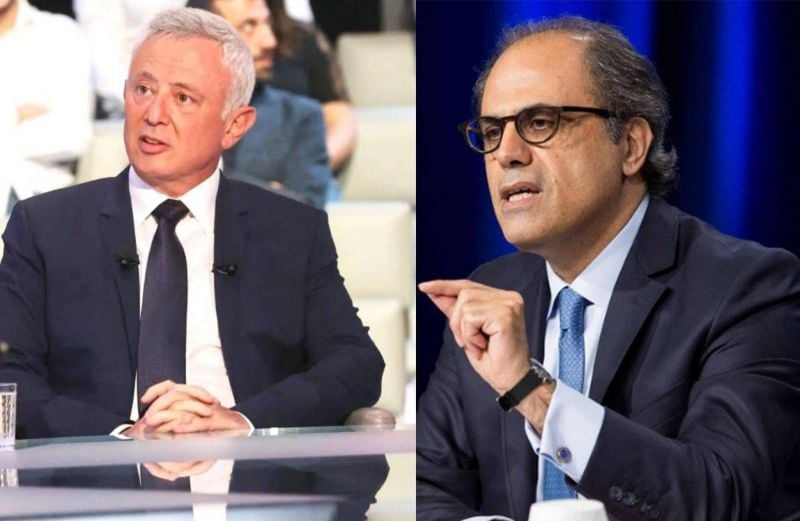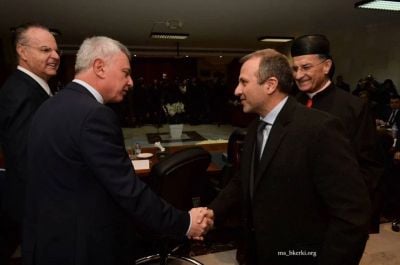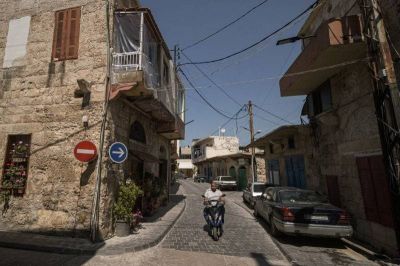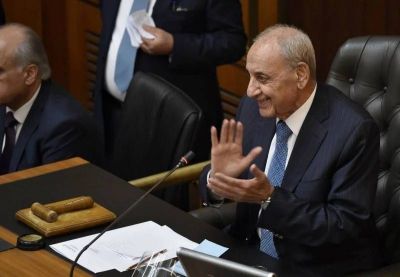
Sleiman Frangieh and Jihad Azour. (Credit: Twitter)
In 1970, Sleiman Frangieh (the elder) was elected president, by a margin of just one vote difference, over his Chehabist competitor, Elias Sarkis.
At the time, it was Kamal Joumblatt’s vote that tipped the balance in favor of Frangieh, after the Progressive Socialist Party (PSP) leader put both candidates to test during a car ride.
Joumblatt was keen to divide the votes of his bloc between the two opponents and to give his own vote to the Zgharta zaim, who thus won the presidential battle. Will history repeat itself today with Frangieh’s grandson?
The elder Frangieh’s election in 1970 is said to be the one involving the least interventions from abroad. Officially, this time too, foreign powers are calling on the Lebanese actors to decide on the election themselves.
This is a democratic game to which they do not seem to be accustomed, as the election of a president has over the years been the result of a compromise concocted outside the walls of Parliament.
Last week, against all odds, Parliament Speaker Nabih Berri called for the presidential election to be held no later than June 15 (before the end of beleaguered central bank governor Riad Salameh’s term).
Berri is reportedly preparing to convene a new electoral session by that date, although he refused to do so in the absence of a broader agreement.
Do the foreign powers’ threat of imposing sanctions against those who have been blocking the election for the past seven months play a role?
This link can’t be ruled out, especially since, according to several Western diplomatic sources, the countries involved in the matter are putting all kinds of pressure to have the Lebanese MPs comply with the rules of the democratic game ... and may the best one win.
Yet, no one can claim to be “the best” today.
According to his sponsors, Amal and Hezbollah, Frangieh has the best chance of being elected. Backed with this certainty, Hezbollah leader Hassan Nasrallah called on his opponents last Friday to go to Parliament and vote for their candidate.
For its part, the camp opposing Frangieh’s election — including Free Patriotic Movement (FPM) leader Gebran Bassil — is making all efforts to agree on a figure capable of facing Frangieh’s candidacy. With a ceiling of about 40 votes in the 11 electoral sessions held so far, the last of which was on Jan. 19, fellow Zgharta MP Michel Moawad is clearly not in a position to take on this role.
An agreement seems imminent. The opposition is only waiting for Bassil to give a final decision. The latter is taking a position that is completely opposed to that of Hezbollah while insisting on endorsing a figure that would not provoke Nasrallah.
A duel and several unknowns
In the meantime, three figures have emerged from the opposition’s consultations: Jihad Azour (former finance minister and director of the IMF's Department for the Middle East and Central Asia), Ziyad Baroud (former interior minister) and Salah Honein (former MP).
“However, Azour is the one we are leaning towards because of his position on the external scene and his strong international relations,” a figure in the anti-Hezbollah camp told L’Orient-Le Jour.
“The former finance minister is an economist and politician, and no camp perceives him as a provocative candidate, which is not the case of Salah Honein who is considered close to the March 14 camp, or Baroud who is vetoed by several actors, including the Lebanese Forces (LF), especially since it was Gebran Bassil — with whom he allied in the 2018 elections — who proposed his name,” the figure added.
Azour has good relations with Joumblatt and Berri, and has met in the past with Hezbollah, according to sources close to the party.
Moreover, he is far from posing a threat to the Christian actors and to the political balance on this scene. Therefore, adopting Azour as a candidate would corner everyone. Azour does not seem to be vetoed, and is capable of making breakthroughs in several camps.
If the opposition reaches this agreement, an electoral session will be more likely, especially since Berri and his camp will no longer be able to justify shutting the doors of Parliament.
However, the battle promises to be a close one. Various scenarios are possible. One is that no candidate would be elected in the first round (for this to happen, 86 votes are required, or two-thirds of the 128 MPs). A second round of voting would then be necessary. In this round, a candidate only needs 65 votes (a simple majority of the 128 MPs) to win.
If the conditions for a compromise are met, none of the parliamentary blocs will play the card of preventing quorum by leaving Parliament.
If Hezbollah and its allies decide otherwise, especially if Frangieh fails to get 65 votes in the first round, it would be a whole different story. The fate of such a battle will depend on three players: the FPM, which Hezbollah is still trying to bring back into its fold, the Sunni MPs, especially the National Moderation bloc, and some independents. Some of them support Frangieh while others see Joumblatt as the compass. This makes the PSP leader the third key player who will tip the balance.
If all the obstacles are overcome and if those opposing Frangieh agree to support Azour, the vote count could be as follows: In a very optimistic scenario, Azour gets 72 votes: 16 FPM, 19 LF, eight PSP, four Kataeb, four from the Renewal bloc (of Michel Moawad), eight from the protest movement MPs, 10 Sunnis and three independent Christians. In this case, Azour could be elected in the second round.
In another, more pessimistic scenario, Azour gets 65 votes: 16 FPM, 19 LF, 8 PSP, four from the Renewal bloc, four Kataeb, five protest movement, six Sunnis and three independent Christians. He is therefore also capable of being elected in the second round.
In both cases, all eyes will be on the camp supporting Frangieh. Will it cause a lack of quorum or will it proceed to the end?
The possibility of seeing Frangieh withdrawing is not to be ruled out. That is especially since Hezbollah repeats over and over again that it does not want to impose its candidate and that it is open to dialogue so long as the other camp put its cards on the table.
A third figure representing a meeting point between the two camps could also emerge. Time will have the answer.
In Lebanon, there is a well-known reality in the political backstage: on several occasions, presidential candidates went to bed high from what they thought would be an easy and woke up to find themselves off the race.
This article was originally published in French in L'Orient-Le Jour. Translation by Joelle El Khoury.


